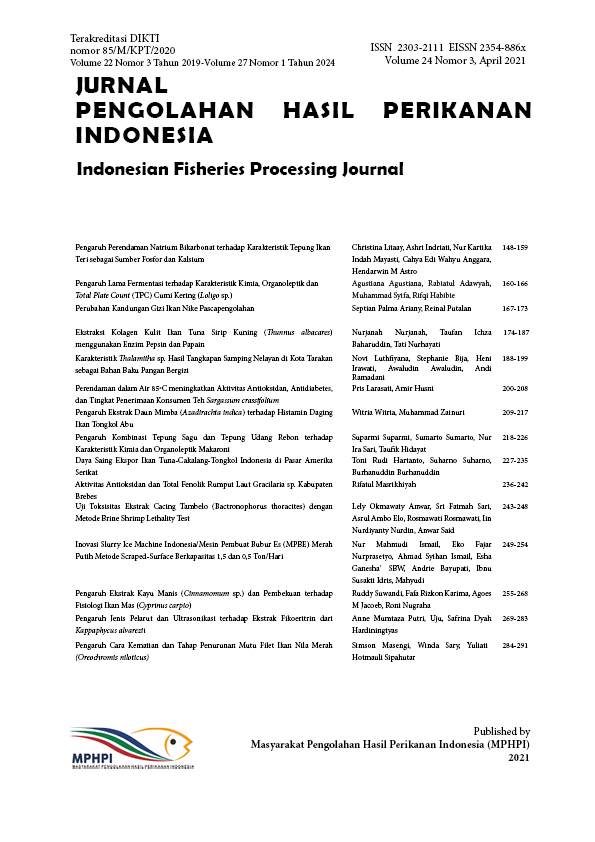Karakteristik dan Profil Asam Lemak Kombinasi Minyak Ikan Patin dan Minyak Hati Ikan Hiu Characteristics and Fatty Acid Profile of Catfish and Shark Liver Oil Mixture
Abstract
Catfish oil is rich in omega-9 fatty acids but low in omega-3 fatty acids. Meanwhile, shark liver oil has a relatively high omega 3 fatty acids content. This study was aimed to determine the characteristics and chemical properties of catfish oil and the fatty acid profile of the catfish oil and shark liver mixture. TBbelly fat of catfish was extracted by dry rendering resulting crude and purified oil. The refined catfish oil ismixed with shark liver oil with a ratio of 1: 1, 2: 1 and 2: 1. The analysis parameters consisted of chemical characteristics (free fatty acid, acid value, peroxide, iodine, p-anisidine, saponification, total oxidation/TOTOX), and fatty acid profile. The results showed that the combination of catfish oil and shark liver produced free fatty acids ranging from 1.59-2.19%, acid number 2.86-3.00 mg KOH/g peroxide value15.50-18.32 meq/kg, iodine number 63.46- 84.42 gI2/100g), p-anisidin value 21.53-24.16, saponification 142.21-162,28 mg KOH/g, and TOTOX 53.33-69.43. Palmitic acid, oleic acid, and linoleic acid were the most dominant saturated, monounsaturated and polyunsaturated fatty acid, respectively. The chemical properties meet the IFOMA's standards. The combination of shark liver oil and catfish with a ratio (2:1) resulted in the highest content of omega-3 (0.65%) and omega-6 (29.75%).
References
Ahmad N. 2014. Analisis minyak hati ikan hiu botol (Centrophorus atromarginatus) di pantai Prigi Watulimo Trenggalek. Jurnal Agrina. 1(1):1-4.
[AOAC] Association of Official Analytical Chemists. 1995. Official Methods of Analysis. Maryland (US): Association of Official Analytical Chemists, Inc.
[AOAC] Association of Official Analytical Chemist. 2005. Official Method of Analysis of the Association of Official Analytical of Chemist. Arlington (US): The Association of Analytical Chemist, Inc.
[AOCS] American Oil Chemists Society. 1995. Official Methods and Recommended Practices of the American Oil Chemists’ Society. Champaign (US): AOCS Press.
[AOCS] American Oil Chemists’ Society. 2003. Official Methods and Recommended Practices of American Oil Chemists’ Society. 5 th ed. Champaign. Illinois (US): AOCS
Bucher HC, Hengstler P, Schindler C, Meier G. 2002. N-3 polyunsaturated fatty acids in coronary heart disease: a meta-analysis of randomized controlled trial. The American Journal of Medicine. 112: 298-304.
Diana FM. 2013. Omega-6. Jurnal Kesehatan Masyarakat. 7(1): 26–31.
Damongilala L. 2008. Kandungan asam lemak tak-jenuh minyak hati ikan cucut botol (Cenctrophorus sp.) yang diekstraksi dengan cara pemanasan. Jurnal Ilmiah Sains. 8(2): 249-253.
Harris WS, Mozaffarian D, Rimm E, Kris Etherton P, Rudel LL, Appel LJ. 2009. Omega 6 fatty acids and risk for cardiovascular disease: a science advisory from the American Heart Association Nutrition Subcommittee of the Council on Nutrition, Physical Activity, and Metabolism; Council on Cardiovascular Nursing; and Council on Epidemiology and Prevention American Heart Association. Circulation. 119(6): 902-907.
Haris W.S. 2004. Ulasan: Suplementasi minyak ikan: Bukti manfaat kesehatan. Jurnal Kedokteran, 71(3): 208-219
Hastarini E. 2012. Karakteristik minyak ikan dari limbah pengolahan filet ikan patin siam (Pangasius hypopthalmus) dan ikan patin jambal (Pangasius djambal). Jurnal Agritech. 32(4): 403-410.
[IFOS] International Fish Oil Standard. 2011. http//www.omegavia.com/ best-fish-oilsupplement-3/. Diakses pada tanggal 12 September 2020.
[IFOMA] International Fishmeal and Oil Manufacurers Association. 1998. Guidelines for characterising food grade fish oil. 9(5): 473-483.
Jacobsen, C. 2004. Developing polyunsaturated fatty acids as functional ingredients. In: Functional foods, cardiovascular disease and diabetes. Arnoldi A (ed.). 2004. Boca Raton (US): CRC Press.
Ketaren S. 2005. Pengantar teknologi minyak dan lemak pangan. Jakarta (ID): UI Press
Kilcast D, Subramaniam Persist. 2011. Food and Beverage Stability and Shelf Life. Cambridge (GB): Woodhead Publishing.
Perrin JL. 1996. Determination of Alteration. In: Karleskind A, Wolff JP. (Eds.) Oils and Fats, Manual vol. 2. France (FR): Lavoisier Publishing
Rodiah NS, Utomo BSB, Basmal J, Hastarini E. 2016. Pemurnian minyak ikan patin dari hasil samping pengasapan ikan. Jurnal Kelautan dan Perikanan. 11(2): 171-182
Rozi A, Suseno SH, Jacoeb AM. 2016. Ekstraksi dan karakterisasi minyak hati cucut pisang. Jurnal Pengolahan Hasil Perikanan Indonesia. 19(2): 100-109.
Suseno SH, Yang TA, Nadia WA, Hamidah A, Ali S. 2010. Inventory and characterization of selected deep sea fish species as an alternative food source from Southern Java Ocean and Western Sumatra Ocean, Indonesia. International Journal of Biological, Biomolecular, Agricultural, Food and Biotechnological Engineering. 4(8): 651-654.
Swanson D, Block R, Mousa SA. 2012. Omega-3 Fatty Acids EPA and DHA: Health Benefits Throughtout Life. Advances in Nutrition. 3: 1-7.
Thammapat P, Raviyan P, Siriamornpun S. 2010. Proximate and fatty acids composition of the muscles and viscera of Asian catfish (Pangasius bocourti). Food Chemistry. 122(1): 223-227.
Von Schack C. 2003. The role of omega-3 fatty acids in cardiovascular disease. Current Atherosclerosis Reports. 5: 139–145.
Authors

This work is licensed under a Creative Commons Attribution 4.0 International License.
Authors who publish with this journal agree to the following terms:
- Authors retain copyright and grant the journal right of first publication with the work simultaneously licensed under a Creative Commons Attribution License that allows others to share the work with an acknowledgement of the work's authorship and initial publication in this journal.
- Authors are able to enter into separate, additional contractual arrangements for the non-exclusive distribution of the journal's published version of the work (e.g., post it to an institutional repository or publish it in a book), with an acknowledgement of its initial publication in this journal.





